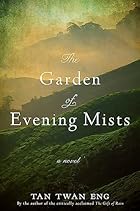I recently had a conversation with a friend of mine about
forgiveness, what it entails, etc. This is a difficult concept, made so by the
glossing over of the hard work that forgiveness demands by our society.
Forgive and Forget
Bury the Hatchet
Water Under the Bridge
You are Dead to Me
I guess that last one is not really so much about
forgiveness. The rest speak to a forgetting, a letting go, and pretending that
the incident never happened. Such an approach, is not a good one at all and can
lead to what experts call, ScE-DaR[1] (spontaneous cranial explosion due to anger repressed by
one). Don’t look it up, it is so cutting edge that the cutting edge people have
no idea it exists. You’ll get cut it is so cutting edge. The point is that when
we try to “forget” we bury and repress and eventually our heads will explode…
or something like that might happen.
Tan Twan Eng’s novel (that’s right, I actually read fiction)
The Garden of Evening Mists, among
many themes, considers the role of forgiveness. Now for those of you looking
for a book review, move on! That is not what this is, it is a reflection. Go
read someone gush about the writing, the poetry, or the fancy book cover,
elsewhere.
Where was I?
Right, forgiveness (but I will not forgive the book review
trolls).
The main character of Eng’s book, Yun Ling, is struggling
with issues of forgiveness. She is a survivor of a Japanese war camp in
Malaysia during World War II where she was maimed, beaten, and emotionally
scarred. While she does not claim to be doing so, Yun Ling is struggling with
her reluctance to forgive the Japanese. A large portion of the book is around
her relationship with Aritomo, a Japanese gardener renowned for his skills. Yun
Ling, the woman who is looking to convict war criminals, the woman who has a
mountain of hatred and animosity towards Japan, reaches out to Aritomo because
she feels a deep urge and desire to create a Japanese garden.
It is because she will not forgive herself.
She is only looking to punish those who hurt her, but is
looking for a sense of reconciliation with her sister through her actions and
engagement with Aritomo. Maybe she understands how important forgiveness is and
how difficult it is to gain.
I do not want to get into the whys with great detail; I do
not want to spoil the book. Yun Ling feels responsible, feels as if she has
wronged her sister and so has to build a garden with someone who represents the
very people she despises. One of the unforeseen consequences of this work is
that is forces her to interact with the people she does not want to forgive.
Yet she must if she ever wants to gain some kind of forgiveness. She has to
learn to trust Japanese individuals and even find value in their culture. Through
her interactions she sees the complexity of the people, the complexity of
individuals in moments of war, and the complexity of blame. No longer can she
blame an entire country for her wounds; she now has to wrestle with them
herself.
Forgiveness is not about forgetting but about remembering.
Forgiveness is not about letting things go, but about holding on and working to
rebuild. Forgiveness is not about burying but exposing and staying in the hurt
with the other. This is for the person seeking forgiveness and the person who
is in the position to offer it. It is difficult, messy work. Garden of Evening Mists looks at the
mess of forgiveness and does not shrink away from its complexity.
This is a strength of the book, but one that you will not
get by skimming it. You need to journey with Yun Ling, you need to remember
with her and continue to remember and learn and grow. It is a novel that is
told in a way that brings you along to the place where you are left having to
decide if you want to forgive, if you are ready to forgive.
In the end, for Yun Ling to forgive she must forget, but it
is not an easy forgetting that she must do. It is one that is only achieved
through great work, difficulty, and pain. This difficult, rebuilding is what
forgiveness really is about.

No comments:
Post a Comment